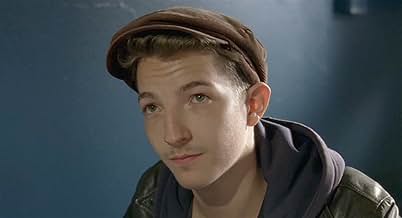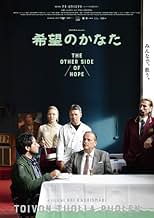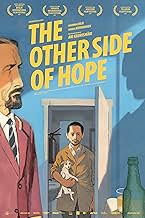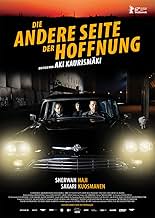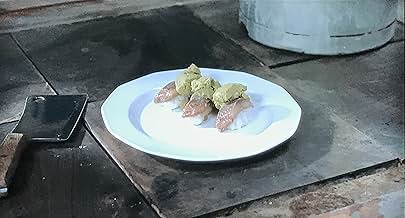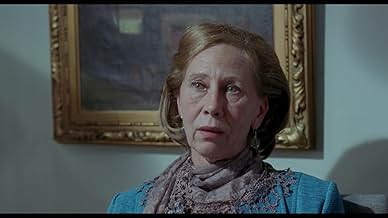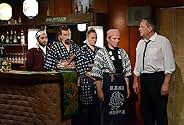IMDb RATING
7.2/10
15K
YOUR RATING
A poker-playing restaurateur and former traveling salesman befriends a group of refugees newly arrived to Finland.A poker-playing restaurateur and former traveling salesman befriends a group of refugees newly arrived to Finland.A poker-playing restaurateur and former traveling salesman befriends a group of refugees newly arrived to Finland.
- Awards
- 8 wins & 24 nominations total
Abdi Jama
- Aseman kassa
- (as Abdi alias 'Lii' Jama)
Simon Al-Bazoon
- Mazdak
- (as Simon Hussein Al-Bazoon)
- Director
- Writer
- All cast & crew
- Production, box office & more at IMDbPro
Featured reviews
Remember the pretty boy Ronan Keating singing that you say it best when you say nothing at all? Of course you don't, you only listen to good music. But this could be the very motto of Finnish legendary moviemaker Aki Kaurismäki's latest. This minimalist masterpiece is so achingly simple and elegant and yet so complex in a good way, that there's no really good way to describe it, if you don't understand Kaurismäki's style already. Toivon tuolla puolen" (The Other Side of Hope" in English, Teispool lootust" in Estonian") is like a haiku: it can convey so much with so little words and even so little action. I can't find fitting comparisions here, but Kaurismäki comes across like Jim Jarmusch's less snobish cousin: even more concentrated on what it's like to be human and small things that life is actually made of. They both value storytelling through details but Kaurismäki's approach is more mainstreamfriendly: you don't have to invest yourself fully all the time to make sense of what's going on exactly. Toivon tuolla puolen" offers two bittersweet stories interwining, about refugee in strange and hostile land and old entrepreneur who leaves his wife and finds fresh start in running a diner. It often feels like comedy – Kaurismäki's approach could be called Finnish version of Soviet nostalgia that many 30-year or older viewers will respond to and enjoy. Judging by Estonian premiere, it's a real crowdpleaser. But deeper down it's more about bleak and sad side of human existence: loneliness, being unwanted, trying to find purpose when everything has fallen down. And, of course, about how there's no winning with nowadays' refugee crisis – it brings suffering for everyone involved, except for maybe those who like to attack people who shouldn't be here". I give this quietly hilarious and heartbreaking masterpiece a near- perfect score. Although it doesn't break new grounds for Kaurismäki, I can't think of a way how it could be improved in any meaningful way. The movie's not gonna satisfy everybody, nothing will, but it's almost perfect the way it is. Deceptively simple but powerful experience that you can't imagine getting from anybody else than Kaurismäki.
Aki Kaurismäki's film 'The Other Side of Hope' is really two films in one: the first, a deadly serious look at the life of a Syrain refugee in Finland, and the other, a deadpan comic look at the escapades of an unlikely restauranteur. Oddly, it works, with its direct abutment of light and shade, and its playful treatment of the legendary Finish characteristic of taciturnity. A nice element of the movie is it's use of music as a symbol of our common humanity. It's a simple film, but I liked it.
In Aki Kaurismäki's 2016 film TOIVON TUOLLA PUOLEN ("The Other Side of Hope"), the Finnish auteur continues a theme he explored in LE HAVRE from five years earlier: refugees fleeing to Europe and forced to survive when heartless officials and some locals are against them. While that earlier film was shot in the comparatively exotic setting of the eponymous French port, TOIVON TUOLLA PUOLEN returns to Kaurismäki's familiar stomping grounds of downtown Helsinki.
The film consists of two converging plot lines. In one, the aging salesman Wikström (Sakari Kuosmanen, a longtime member of Kaurismäki's acting stable) leaves his wife, wins a lot of money in a poker game, and decides to open a restaurant. In the other, the Syrian refugee Khaled (Sherwan Haji) arrives in Helsinki after fleeing war-torn Aleppo and wandering across half of Europe, but he is worried about his sister that he got separated with along the way. Wikström and Khaled eventually meet and become friends -- or the closest thing to friends that Kaurismäki's exaggeratedly cold and morose Finns can get to each other. Before that, however, the Wikström plot line serves to inject some humour, albeit of an extremely deadpan sort, into a film that, though Khaled, explores the depressing lives of refugees who are shuffled from one center to another and forced to wait for their cases to be processed.
For three decades now, Kaurismäki has made all his films to a very distinctive template that virtually never varies. Its characters speak a minimum of dialogue to each other and show little expression on their faces. The sets are drab in colour and deliberately anachronistic, with gadgets, vehicles or clothes from the 1950s alongside computers and mobile phones from our time. At some point, a band will appear on stage playing oldies rock, blues, or Finnish tangos as the characters look on.
TOIVON TUOLLA PUOLEN doesn't stray from that template either. Still, the script has enough fresh moments to it that it will feel worthwhile even to longtime Kaurismäki films who have sat through this template many times before. Some of the humorous bits are laugh-out-loud funny, but overall this does feel like a darker film than most of the director's work. It is ultimately a choked, restrained cry of rage at the way that refugees are treated, by a Nordic society that prides itself on fairness, equality and charity. While Kaurismäki is roughly on the left politically, several of his films have attacked the Finnish welfare state for its opaque bureaucracy and its reduction of human beings to mere papers in a government file. This film continues that critique by depicting the refugees, who come from many countries but manage to band together to lend each other help, as the sort of neighborly solidarity that Kaurismäki prefers to faceless bureaucracy.
I personally wouldn't find this the best introduction to Kaurismäki. His earlier film MIES VAILLA MENNEISYYTTÄ ("The Man Without a Past") depicted with more meat on its bone a down-on-his-luck man lost among bureaucracy, while the über-idiosyncratic romantic comedy VAROJA PARATIISISSA ("Shadows in Paradise") is one of Kaurismäki's best achievements in deadpan humour. Still, TOIVON TUOLLA PUOLEN seems to tell a story universal enough to pull on everyone's heartstrings and is worth seeing.
The film consists of two converging plot lines. In one, the aging salesman Wikström (Sakari Kuosmanen, a longtime member of Kaurismäki's acting stable) leaves his wife, wins a lot of money in a poker game, and decides to open a restaurant. In the other, the Syrian refugee Khaled (Sherwan Haji) arrives in Helsinki after fleeing war-torn Aleppo and wandering across half of Europe, but he is worried about his sister that he got separated with along the way. Wikström and Khaled eventually meet and become friends -- or the closest thing to friends that Kaurismäki's exaggeratedly cold and morose Finns can get to each other. Before that, however, the Wikström plot line serves to inject some humour, albeit of an extremely deadpan sort, into a film that, though Khaled, explores the depressing lives of refugees who are shuffled from one center to another and forced to wait for their cases to be processed.
For three decades now, Kaurismäki has made all his films to a very distinctive template that virtually never varies. Its characters speak a minimum of dialogue to each other and show little expression on their faces. The sets are drab in colour and deliberately anachronistic, with gadgets, vehicles or clothes from the 1950s alongside computers and mobile phones from our time. At some point, a band will appear on stage playing oldies rock, blues, or Finnish tangos as the characters look on.
TOIVON TUOLLA PUOLEN doesn't stray from that template either. Still, the script has enough fresh moments to it that it will feel worthwhile even to longtime Kaurismäki films who have sat through this template many times before. Some of the humorous bits are laugh-out-loud funny, but overall this does feel like a darker film than most of the director's work. It is ultimately a choked, restrained cry of rage at the way that refugees are treated, by a Nordic society that prides itself on fairness, equality and charity. While Kaurismäki is roughly on the left politically, several of his films have attacked the Finnish welfare state for its opaque bureaucracy and its reduction of human beings to mere papers in a government file. This film continues that critique by depicting the refugees, who come from many countries but manage to band together to lend each other help, as the sort of neighborly solidarity that Kaurismäki prefers to faceless bureaucracy.
I personally wouldn't find this the best introduction to Kaurismäki. His earlier film MIES VAILLA MENNEISYYTTÄ ("The Man Without a Past") depicted with more meat on its bone a down-on-his-luck man lost among bureaucracy, while the über-idiosyncratic romantic comedy VAROJA PARATIISISSA ("Shadows in Paradise") is one of Kaurismäki's best achievements in deadpan humour. Still, TOIVON TUOLLA PUOLEN seems to tell a story universal enough to pull on everyone's heartstrings and is worth seeing.
After 'Le Havre', this is Kaurismäki's second film about refugees. This is a hot topic, now even more than ever. Europe is still trying to digest the influx of refugees from Syria and Iraq, a process with major political consequences.
There is no doubt about Kaurismäki's moral position. The lead characters in 'The other side of hope' don't even discuss if they should help the Syrian refugee Khaled, they just do it as if there is no other choice. In perhaps Kaurismäki's most political scene ever, a police officer tells Khaled that Aleppo, the city where he came from, is not unsafe according to the Finnish immigration authority, so he should be deported back to Syria. Immediately after the verdict, Kaurismäki shows a news report on Finnish television about the atrocities going on in Aleppo.
The complete lack of emotions, a trademark feature of Kaurismäki's work, adds an extra dimension to the message. The refugee doesn't complain, his protectors don't discuss, the violent racists don't explain. Everything just happens.
Of course, this being a Kaurismäki film, there are the typical elements of his movies: the fifties aesthetics, the deadpan humor, the stripped-to-the-bone dialogue. Music is also an important element in this film. It is, without exception, source music from musicians playing in bars, café's or in the street. It is all sung in Finnish, but has a very bluesy feeling, perfectly matching the overall mood of the film.
The screenplay has a special structure: for the most part of the film, the viewer is watching two separate stories. One is about the refugee Khaled entering the country as a stowaway in a cargo ship, trying to find his way in society and being processed by the immigration authority. The other is about a business man trying to revive an unprofitable restaurant. Of course, the two are destined to run into each other.
Kaurismäki is one of those film makers whose style is unique and doesn't resemble anything else. For that reason alone, his work is worth watching. In this film, he adds a political message which is as urgent as can be.
There is no doubt about Kaurismäki's moral position. The lead characters in 'The other side of hope' don't even discuss if they should help the Syrian refugee Khaled, they just do it as if there is no other choice. In perhaps Kaurismäki's most political scene ever, a police officer tells Khaled that Aleppo, the city where he came from, is not unsafe according to the Finnish immigration authority, so he should be deported back to Syria. Immediately after the verdict, Kaurismäki shows a news report on Finnish television about the atrocities going on in Aleppo.
The complete lack of emotions, a trademark feature of Kaurismäki's work, adds an extra dimension to the message. The refugee doesn't complain, his protectors don't discuss, the violent racists don't explain. Everything just happens.
Of course, this being a Kaurismäki film, there are the typical elements of his movies: the fifties aesthetics, the deadpan humor, the stripped-to-the-bone dialogue. Music is also an important element in this film. It is, without exception, source music from musicians playing in bars, café's or in the street. It is all sung in Finnish, but has a very bluesy feeling, perfectly matching the overall mood of the film.
The screenplay has a special structure: for the most part of the film, the viewer is watching two separate stories. One is about the refugee Khaled entering the country as a stowaway in a cargo ship, trying to find his way in society and being processed by the immigration authority. The other is about a business man trying to revive an unprofitable restaurant. Of course, the two are destined to run into each other.
Kaurismäki is one of those film makers whose style is unique and doesn't resemble anything else. For that reason alone, his work is worth watching. In this film, he adds a political message which is as urgent as can be.
In modern-day Helsinki, the lives of two characters are followed: Waldemar (Sakari Kuosmanen) is beginning a new life as a single man and opening a new restaurant; and Khaled (Sherwan Haji) is a refugee from Allepo, Syria seeking asylum in Finland.
This film deserves credit for taking on a subject that continues to grab headlines and personalizes it. The Finns in this movie are mostly portrayed as generous and fair-minded with a few exceptions: some are seen as idiotic government bureaucrats (an international problem), and others are seen as downright nasty thugs (a bigger international problem).
The directing style by Aki Kaurismaki is in his usual style of being deliberately austere and distant with moments of dry humour. It works well mostly but there could have been room for a few moments of deeper emotion considering the subject matter.
A shocking twist at the end does give the film some jolt but the ambiguity of the situation (which is also far-fetched to a degree) is unsatisfying. Despite this, "The Other Side of Hope" is a fine film. As it focuses mostly on Khaled, Haji comes off as a very fine anchor for the movie. - dbamateurcritic
This film deserves credit for taking on a subject that continues to grab headlines and personalizes it. The Finns in this movie are mostly portrayed as generous and fair-minded with a few exceptions: some are seen as idiotic government bureaucrats (an international problem), and others are seen as downright nasty thugs (a bigger international problem).
The directing style by Aki Kaurismaki is in his usual style of being deliberately austere and distant with moments of dry humour. It works well mostly but there could have been room for a few moments of deeper emotion considering the subject matter.
A shocking twist at the end does give the film some jolt but the ambiguity of the situation (which is also far-fetched to a degree) is unsatisfying. Despite this, "The Other Side of Hope" is a fine film. As it focuses mostly on Khaled, Haji comes off as a very fine anchor for the movie. - dbamateurcritic
Did you know
- TriviaThe actors playing siblings Khaled and Miriam are real-life siblings.
- ConnectionsFeatured in Ismo Haavisto One Man Band: Midnight Man (2017)
- SoundtracksOi mutsi, mutsi
Written and performed by Tuomari Nurmio
- How long is The Other Side of Hope?Powered by Alexa
Details
- Release date
- Countries of origin
- Official sites
- Languages
- Also known as
- The Other Side of Hope
- Filming locations
- Helsinki, Finland(The city)
- Production companies
- See more company credits at IMDbPro
Box office
- Budget
- €1,600,000 (estimated)
- Gross US & Canada
- $183,943
- Opening weekend US & Canada
- $15,495
- Dec 3, 2017
- Gross worldwide
- $4,282,973
- Runtime
- 1h 40m(100 min)
- Color
- Sound mix
- Aspect ratio
- 1.85 : 1
Contribute to this page
Suggest an edit or add missing content


